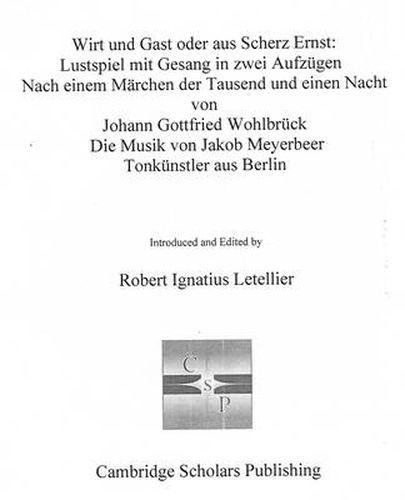Readings Newsletter
Become a Readings Member to make your shopping experience even easier.
Sign in or sign up for free!
You’re not far away from qualifying for FREE standard shipping within Australia
You’ve qualified for FREE standard shipping within Australia
The cart is loading…






The subject-matter of Meyerbeer’s second opera Wirt und Gast, or Aus Scherz Ernst (also called Alimelek), written in Munich in 1812, was taken from a tale in The Arabian Nights. The story of the man who would be sovereign, if only for one day, so frequently treated in the literature of all nations. The opera is an example of
the Oriental or Turkish operas which were so popular in Germany during the second third of the eighteenth century.
. The orchestra includes, besides the strings, doubled wood-wind, and threefold percussion, only two horns, two trum pets, and one trombone. While Meyerbeer’s contemporaries were puzzled by the far- fetched singularity of the Alimelik music, and the work had no success in Stuttgart and Vienna (6 January 1813; 20 October 1814), Weber had the insight to recognize its true significance. He produced it
Prague on 20 October 1815, and praised the active, alert imagination, the well-nigh voluptuous melody, the correct declamation, the entire musical attitude. He was also impressed by the instrumentation: It is surprisingly combined, interwoven with great delicacy, and consequently demands almost the care of a quartet performance. Weber’s enduring admiration meant that he again produced the work in Dresden years later (1820), when he pointed out how this early opera
bears witness to the composer’s singular emotional capacity. This edition reproduces the original Stuttgart MS, reflecting cuts made in the first performance.
$9.00 standard shipping within Australia
FREE standard shipping within Australia for orders over $100.00
Express & International shipping calculated at checkout
Stock availability can be subject to change without notice. We recommend calling the shop or contacting our online team to check availability of low stock items. Please see our Shopping Online page for more details.
The subject-matter of Meyerbeer’s second opera Wirt und Gast, or Aus Scherz Ernst (also called Alimelek), written in Munich in 1812, was taken from a tale in The Arabian Nights. The story of the man who would be sovereign, if only for one day, so frequently treated in the literature of all nations. The opera is an example of
the Oriental or Turkish operas which were so popular in Germany during the second third of the eighteenth century.
. The orchestra includes, besides the strings, doubled wood-wind, and threefold percussion, only two horns, two trum pets, and one trombone. While Meyerbeer’s contemporaries were puzzled by the far- fetched singularity of the Alimelik music, and the work had no success in Stuttgart and Vienna (6 January 1813; 20 October 1814), Weber had the insight to recognize its true significance. He produced it
Prague on 20 October 1815, and praised the active, alert imagination, the well-nigh voluptuous melody, the correct declamation, the entire musical attitude. He was also impressed by the instrumentation: It is surprisingly combined, interwoven with great delicacy, and consequently demands almost the care of a quartet performance. Weber’s enduring admiration meant that he again produced the work in Dresden years later (1820), when he pointed out how this early opera
bears witness to the composer’s singular emotional capacity. This edition reproduces the original Stuttgart MS, reflecting cuts made in the first performance.